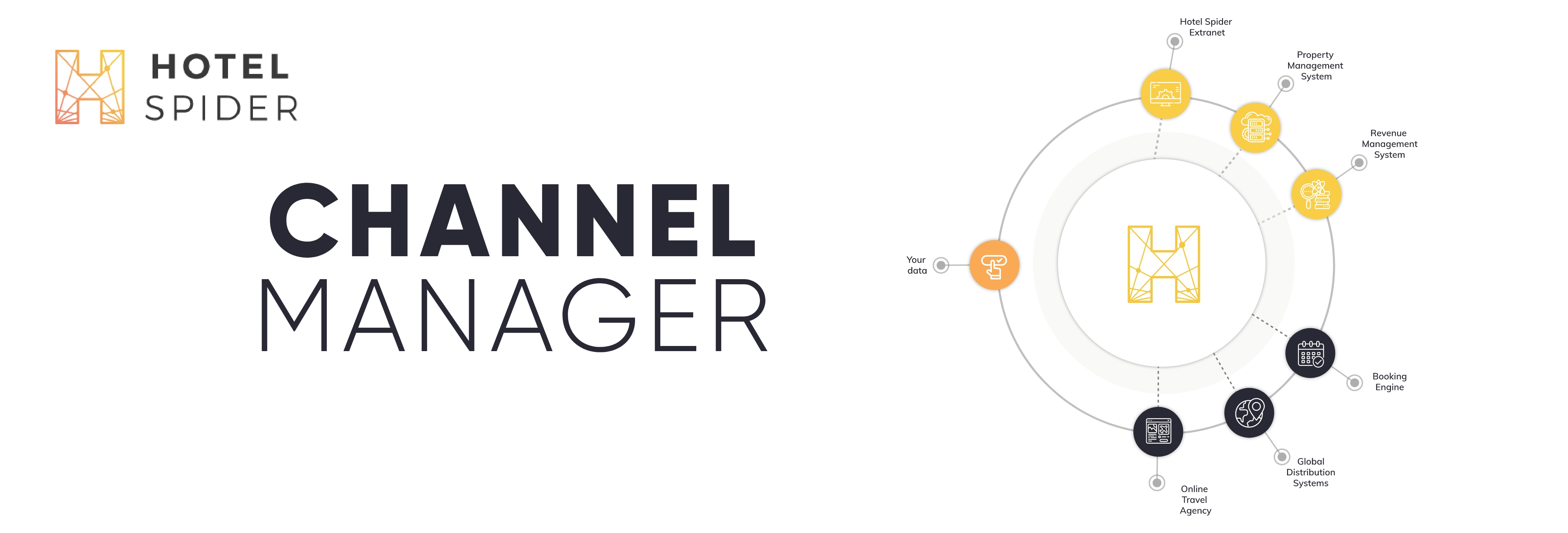
But what exactly does a channel manager do? How did this technology come about and what does the future of channel managers for hotels look like?
Today, the confusing distribution landscape makes online sales a challenge for hotels.
Channel managers have therefore become an indispensable part of daily operations. They enable hotels to leverage versatile sales opportunities to expand their reach, sell more rooms, and diversify their sales strategy. Channel managers also save you time and reduce the risk of human error.
But what exactly does a channel manager do? How did this technology come about and what does the future of channel managers for hotels look like?
What is a channel manager?
A hotel channel manager is cloud-based software that enables hotels to offer their inventory simultaneously on various online sales platforms. This includes OTAs, GDS (global distribution systems) and the hotel website, among others.
When a guest reserves a room, the channel manager passes on the booking data to the hotel’s PMS. There the reservation is saved and the room is blocked. The channel manager picks up this information and immediately removes the room from the inventory on all channels. This drastically reduces double bookings and unwanted overbooking for the hotel. At the same time, this allows the hotel to advertise its entire available inventory on all relevant portals.
This gives hotels some massive advantages. Your reach is hugely increased through your presence on many different platforms. This gives you a better chance of filling all rooms. Channel managers also save hoteliers an enormous amount of time and stress.
Today, bookings, availability, and room prices, for example, can be kept updated in real time on all channels. Some platforms even make it possible to share booking conditions and other hotel information (e.g. descriptions, images, packages, etc.) on sales channels. Further developments in this area are already in the pipeline for numerous providers.
But it wasn't always that easy. Let's take a look at how channel managers have developed, the current trends, and how things could develop in the future.

Online sales: It all used to be done "by hand"
Before the age of the internet, hotels used to rent their rooms with the aid of elaborate price lists that were used in-house and by sales partners. Everything was done offline, that is, by post, phone, or walk-ins.
The pioneers of modern online sales
Airlines were the first companies to put their booking systems online, but obviously not right from the start. From the 1920s to the 1950s, all flight bookings had to be entered by hand into a physical central register, the first global distribution system (GDS), so to speak. In 1952, American Airlines developed an electromechanical computer consisting of a magnetic drum memory, which accelerated the manual updating of the inventory.
The breakthrough finally came in the 1950s when American Airlines, together with IBM, developed the Semi-Automated Business Research Environment (SABRE). For the first time, this allowed reservations to be automatically saved and updated in a central system. From then on, sales points always knew exactly how many seats were still available. From 1960, all American Airlines bookings were processed with SABRE.
IBM made similar technology available to other airlines and thus this technological innovation quickly spread throughout the sector. SABRE evolved over the years from just a booking system for flights to one of the largest GDSs, today used by thousands of hotels worldwide.
Inspired by the airlines, large hotel chains developed electronic central reservation systems (CRS). However, these were primarily used internally and couldn’t be connected to external sales systems.
This all changed in 1988. 17 leading hotel companies joined forces and founded THISCO (The Hotel Industry Switch Company). As a result, electronic interfaces were established for the first time between the hotel companies' central reservation systems and the five existing global sales systems.
THISCO was later renamed Pegasus Systems and then Pegasus Solutions. When the sales department of Pegasus Solutions was sold in 2015, it was renamed DHISCO (Distribution Hospitality Intelligent Systems Company). DHISCO has been part of RateGain since 2018.
Online sales gather speed
HRS was founded in 1972 as a travel agency, and today it's one of the top OTAs. In the 1980s, the company developed its computer-aided booking system, with which HRS became the first provider to make electronic reservations possible in 1989.
From then on, online sales in other sectors followed suit. For the first time in the mid '90s, travelers were able to reserve rooms via the internet. Hotels used the first interfaces to share their prices and availability, but still had to upload and update all information by hand.
The first booking portals came into being in the late 90s. In 1996, booking.com and Expedia were founded. At that time, hotels still had to send their data and availabilities to each partner individually and update them regularly. The hotelier was like a human channel manager.
To begin with, hotels only assigned part of their inventory to each platform. This was allocated manually and uploaded to the portals extranet. Once this contingent was sold out, no further reservations came from this source. But that didn’t mean that the hotel was fully booked, because sales did not go equally well in all portals, of course. If hotels wanted to avoid losing potential Reservations as a result, they had to offer the same inventory on multiple platforms and accept the risk of overbooking, and the associated problems.
The first steps toward pseudo-automatisation
The first channel managers were intended to simplify this laborious process. However, the options back then were very limited. Hoteliers first had to enter their prices, availability, and booking conditions manually into an extranet. Then employees of the channel management provider had to manually enter the data on each OTA via the extranet.
Scraping was developed to replace many of these manual steps. This involved a script simulating an employee logging in, and the data entry into the OTAs' extranet was done automatically. However, this only worked as long as nothing changed in the OTAs' extranet. Error messages or warnings were not possible in the event of incorrect transmissions from the OTAs.
After a few years, new developments brought about the first systems providing automated communication between hotels and sales channels with the help of XML.
One-way communication made possible
New interfaces between hotels and their sales partners then made one-way automatic communication possible. Inventory, room prices and, in some cases, booking conditions could finally be forwarded from the hotel directly to the sales channel in real time.
Incoming Reservations still had to be entered manually into the PMS so that the room could be locked in for the guest and the remaining inventory could be adjusted. The hotel also had to manually report cancellations or changes to the channel manager so that they could forward them to partners. Despite these limitations, one-way communication saved a lot of time and made life much easier for hoteliers.
Two-way communication brings channel managers to the next level
The development of two-way communication for channel managers made them even more significant. As was previously the case, inventory, prices, and conditions can be automatically forwarded from the hotel to sales channels. It's now also possible for the first time to enter reservations, cancellations, and other changes directly into the PMS via the channel manager.
This evolution ensures much greater efficiency and fewer errors in hotel operations, because significantly fewer manual steps are required to sell the hotel on as many channels as possible. In addition, real-time inventory updates drastically reduce the risk of unwanted overbooking.
New possibilities for optimizing online sales
Automatic two-way communication in by no means the latest channel manager innovation. They enable hotels to do far more than just receive reservations and share inventory, prices, and conditions. Channel managers also play a role in optimizing the distribution strategy and can help you to concentrate on the most profitable and productive channels.
Expansion of channel managers with APIs
An API (application programming interface) defines how software components interact with one another and enables data to be exchanged between applications. Numerous APIs have been developed for channel managers in recent years to support you in optimizing your sales.
Product and property APIs
With product and property APIs, you can quickly create, change, or delete room categories, price ranges, products, and entire hotel profiles on OTAs. They can also help you tailor your offering a little more to the target audience on each channel.
Content API
A content API enables content such as images and hotel descriptions to be exchanged quickly. This interface creates a direct connection to OTAs and makes it easy to create, maintain, and update hotel profiles. Previously, hotels had to add content such as photos, descriptions, and equipment details to each portal individually. All of this is now automated, saving you a lot of time and effort. For example, you can easily upload your latest images to promote your recent renovation, re-branding, or seasonal offers.
As you can see, a lot is possible with APIs. Unfortunately, there is still no industry-wide standard to which all stakeholders orient themselves. These days, too many PMS providers and platforms still want to implement their own ideas and there is still too much room for individual interpretation of established API standards, such as OTA, HTNG, or AlpineBits. Only when everyone is on the same page will the industry take its next step.
The future of the channel manager
The number of OTAs has multiplied in recent years. In 2008, Airbnb came on the scene. But many small niche platforms, local OTAs (e.g. Feratel, STC, Tomas) and meta sites (e.g. Trivago, Google) are also playing an increasingly important role in online sales. This trend will continue in years to come.
In order to be present on all of these platforms, a hotel needs a channel manager like Hotel-Spider, which specializes in connecting numerous interfaces and optimizing them. The booking.com and Expedia connections that some PMS offer are not sufficient, as they limit the reach of your users and, overall, only allow very limited handling and price maintenance.
The increased focus on APIs by many OTAs and PMS providers is also important to note. Channel managers can use this development to further improve their services and promote integrations with other tools and systems.
Another trend that's gathering momentum is attribute-based selling (ABS). Travelers can reserve and pay for rooms based on their attributes (e.g. balcony, view, floor, proximity to the elevator, etc.). The room category is no longer the only decision-making factor. To keep pace with the trend of customizing reservations and stays, a channel manager like Hotel-Spider is necessary, as it can also convey these kinds of details.
As you can see, selling online is already quite complex. And it won't be any simpler in the future either. Continuous technological innovations, changed legal frameworks (e.g. GDPR and PsD2), trends, and new competitors make it difficult for hoteliers to maintain an overview and to guarantee optimized distribution.
It is therefore essential to have a specialized distribution partner who understands and implements the latest trends and changes. Just as revenue management is hardly imaginable without Excel, the channel manager is also indispensable for online sales.
And as long as there are no uniform standards in the market and all platforms and providers have their own interfaces, a channel manager will remain the only option for hotels to master online sales.
Be one step ahead of it all! Always implement your sales strategies in the best possible way and without stress – with a distribution partner who supports you on all levels.


